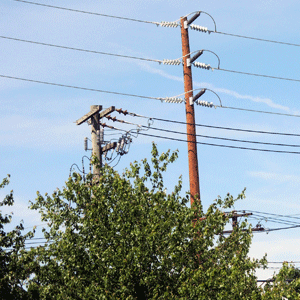 The Town of North Hempstead is on the cusp of adopting legislation regarding so-called dual poles that could land it with lawsuits.
The Town of North Hempstead is on the cusp of adopting legislation regarding so-called dual poles that could land it with lawsuits.
The town has been holding public hearings on the proposed law, which would require public utilities to remove any “decommissioned” utility poles from roadways, leaving just new poles in place. It comes after PSEG LI put up 210, 80- and 85-foot poles this year, next to older 40- and 45-foot poles, as part of an initiative to improve power reliability.
While wording in town media releases confines the proposed dual pole legislation to town roads, where the town has authority, Supervisor Judi Bosworth says the law “covers the entire Town of North Hempstead,” including roads that are governed by the state, the county and villages.
“Is the legislation we are proposing going to be litigated?” Bosworth said. “It might be” by a utility or telecom company that doesn’t feel the town can dictate what is done along non-town roads.
But Bosworth is determined nonetheless, and Town Attorney Liz Botwin feels there is enough wiggle room for the town to declare authority. The legislation “was written broadly,” Botwin said, with right of ways included. Botwin described right of ways as “someplace the town would have a right to go in, such as a path next to a road; a sidewalk, not a road.”
While the area that PSEG worked on for the pole project is entirely in the Town of North Hempstead, the roads that received the poles are mainly overseen by the state, not town. Port Washington and Northern boulevards—both state roads—received the lion’s share of poles.
In fact, of the 210 poles placed, just 23, or about 10 percent, are on town property, giving the town law short reach if it was to confine itself to town roads.
The proposed legislation is the latest salvo fired by the town, which tried, at residents’ behest, to prevent PSEG LI from its controversial installation of the giant poles along five miles of roadways from Port Washington to Great Neck. The electrical part of the project was completed in mid-June, when power was switched over from old poles to the new ones. But the old poles have yet to be removed by PSEG, or Verizon or Cablevision, the latter two of which still have wires on them. PSEG has removed its wires from the poles, said PSEG LI spokesman Jeffrey Weir.
Residents say they don’t see much, if any, movement in terms of the old poles coming down. “Verizon, Cablevision and Lightower Fiber (a network service) are working along the route transferring their [lines] and progressing with the removal of the poles,” Weir said. “As [lines] are transferred, the poles will be removed, primarily by Verizon.” When asked how many poles have been removed so far, Weir referred the question to Verizon. Verizon’s media relations director did not respond to a request for comment.
The job falling to Verizon is in sync with what Weir and Bosworth have said; that the last entity to switch lines is responsible for taking out the old poles. The telecom is usually the last to switch lines, Weir said. And Bosworth said the last entity to remove its wires will be the one responsible for removing the poles.
The PSEG project and its 80-foot poles “brought our attention” to the issue, Bosworth said. “But there are double poles throughout our town, so this is much broader.” At the town’s last public hearing, on Aug. 12, several amendments to the proposed law were suggested, including extending the time limit for removal from 15 days to 30 days and allowing extra time for utility companies to remove double-poles if an “act of God” occurs. The hearing remains open until the town board’s Sept. 9 meeting.
If the legislation is adopted at the Sept. 9 meeting, the penalty for not removing poles is $500 for a first offence and $1,000 for a subsequent offence. Civil penalties are $500 for each violation.
An amendment requiring PSEG to place a warning sign on any newly installed pole that has been treated with Pentachlorophenol (Penta), a chemical treatment for wood, will be considered as a separate resolution. The town calls Penta “a known carcinogenic.”
PSEG will not be placing those warning signs, Weir said, given the use of penta is a common practice by utility companies all over the country. Penta is a wood preservative that protects from rot and infestation, Weir said, and “has been approved for use in utility poles by the EPA for more than 60 years.”



































